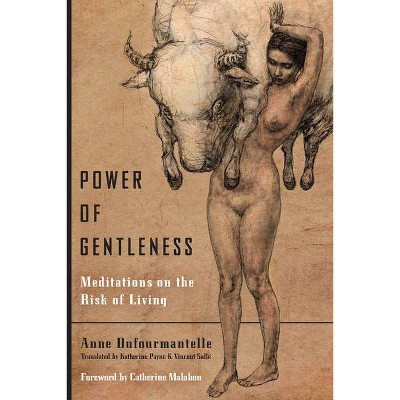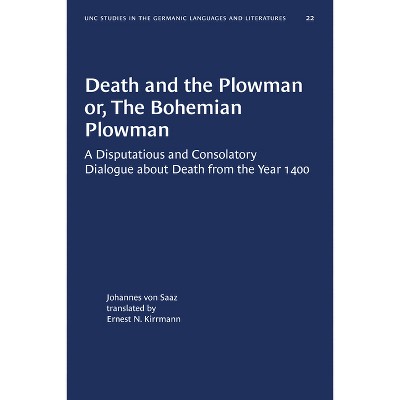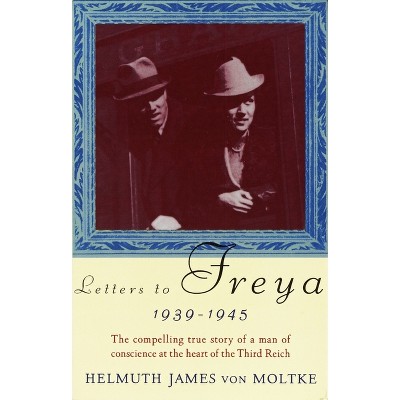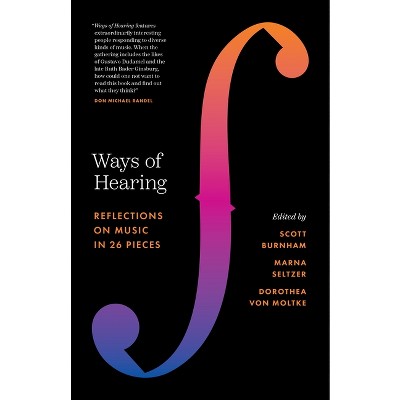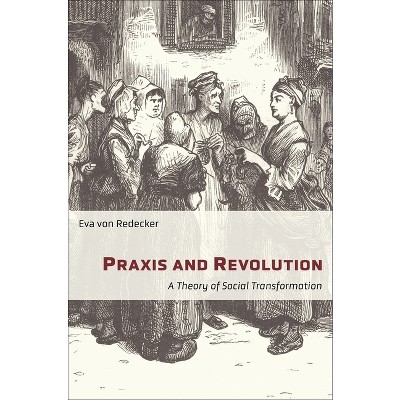Sponsored

The Curious Humanist - by Johannes Von Moltke (Paperback)
$34.99
In Stock
Eligible for registries and wish lists
Sponsored
About this item
Highlights
- During the Weimar Republic, Siegfried Kracauer established himself as a trenchant theorist of film, culture, and modernity, and he is now considered one of the key thinkers of the twentieth century.
- About the Author: Johannes von Moltke is Professor of Screen Arts and Cultures and Professor and Chair of Germanic Languages and Literatures at the University of Michigan.
- 336 Pages
- Philosophy, Movements
Description
About the Book
"Siegfried Kracauer is today considered one of the key thinkers of the twentieth century. During the Weimar Republic, he established himself as a trenchant theorist of film, culture, and modernity, now often ranked alongside his friends Walter Benjamin and Theodor W. Adorno. When he arrived in Manhattan aboard a crowded refugee ship in 1941, however, he was virtually unknown in the United States and had yet to write his best-known books, From Caligari to Hitler and Theory of Film. In this study, Johannes von Moltke details the intricate ways in which the American intellectual and political context shaped Kracauer's seminal contributions to film studies and shows how Kracauer's American writings helped shape the emergent discipline in turn. Through archival sources and detailed readings of Kracauer's work, von Moltke reconstructs what it means to consider Siegfried Kracauer as the New York Intellectual he became when he settled in Manhattan for the last quarter century of his life. Here, he found an institutional home at the MoMA film library, contributed to communications and propaganda research under the aegis of the Rockefeller Foundation, and published in the influential "little magazines" of the New York Intellectuals. Adopting a transatlantic perspective on Kracauer's work, von Moltke demonstrates how he pursued questions that animated contemporary critics from Adorno to Hannah Arendt, from Clement Greenberg to Robert Warshow: questions about the origins of totalitarianism and the authoritarian personality, about high and low culture, about liberalism, democracy, and what it means to be human. From these wide-flung conversations and debates, Kracauer's own voice emerges as that of an incisive cultural critic invested in a humanist understanding of the cinema."--Provided by publisher.Book Synopsis
During the Weimar Republic, Siegfried Kracauer established himself as a trenchant theorist of film, culture, and modernity, and he is now considered one of the key thinkers of the twentieth century. When he arrived in Manhattan aboard a crowded refugee ship in 1941, however, he was virtually unknown in the United States and had yet to write his best-known books, From Caligari to Hitler and Theory of Film. Johannes von Moltke details the intricate ways in which the American intellectual and political context shaped Kracauer's seminal contributions to film studies and shows how, in turn, Kracauer's American writings helped shape the emergent discipline. Using archival sources and detailed readings, von Moltke asks what it means to consider Kracauer as the New York Intellectual he became in the last quarter century of his life. Adopting a transatlantic perspective on Kracauer's work, von Moltke demonstrates how he pursued questions in conversation with contemporary critics from Theodor Adorno to Hannah Arendt, from Clement Greenberg to Robert Warshow: questions about the origins of totalitarianism and the authoritarian personality; about high and low culture; about liberalism, democracy, and what it means to be human. From these wide-flung debates, Kracauer's own voice emerges as that of an incisive cultural critic invested in a humanist understanding of the cinema.From the Back Cover
"Owing to its breathtaking sweep and force of argument, its uncommonly scrupulous research, and the impeccable quality of writing in evidence at every turn, The Curious Humanist represents a landmark achievement in Kracauer scholarship."--Noah Isenberg, author of Edgar G. Ulmer: A Filmmaker at the Margins "Between cultured cosmopolitanism and embattled exile, Siegfried Kracauer stands in this eloquent, intelligent account as one of war-time and postwar America's ablest cultural critics. Von Moltke's demonstration of Kracauer's complex relationship to the New York Intellectuals is particularly brilliant and makes this book an accomplished exercise in intellectual history."--Dana Polan, New York University"This engrossing study joins the dots in the scattered extant scholarship on the New York Kracauer, revealing a skeptically humanist cultural critic whose work--as von Moltke demonstrates through painstaking archival reconstructions and scintillating re-readings of classical works--offers key insights into aesthetics and politics in our allegedly posthumanist times."--Erica Carter, King's College London
Review Quotes
"The Curious Humanist: Siegfried Kracauer in America constitutes an important step in the exploration of the relations between intellectual development and migration. It constitutes an important addition to the scholarship of Kracauer and the American intellectual sphere at midcentury."-- "Film Quarterly"
"[Moltke] argues in defense of Kracauer's writing in America and in English against the mild skepticism it met with from those who found him a better writer in Europe and in German. Setting up this resistance to the "classic figure of the intellectual in exile" (6), he sets out to show how adeptly Kracauer found his feet with a new audience on a new stage."-- "Monatshefte"
"Von Moltke places Kracauer in dialogue with other exiles--such as Hannah Arendt and theorists of the Frankfurt School--and with New York intellectuals such as Robert Warshow to shed light on Kracauer's fundamental humanism. Clearly written, accessible to a wide readership, and including a comprehensive bibliography, this book provides an excellent overview of Kracauer's thought and contributions to the development of humanistic inquiry."-- "CHOICE" (4/1/2017 12:00:00 AM)
About the Author
Johannes von Moltke is Professor of Screen Arts and Cultures and Professor and Chair of Germanic Languages and Literatures at the University of Michigan. He is the author of No Place Like Home: Locations of Heimat in German Cinema and the editor of two volumes of writings by and about Siegfried Kracauer.Dimensions (Overall): 9.0 Inches (H) x 6.0 Inches (W) x .74 Inches (D)
Weight: 1.07 Pounds
Suggested Age: 22 Years and Up
Number of Pages: 336
Genre: Philosophy
Sub-Genre: Movements
Publisher: University of California Press
Theme: Critical Theory
Format: Paperback
Author: Johannes Von Moltke
Language: English
Street Date: June 21, 2016
TCIN: 1005681094
UPC: 9780520290945
Item Number (DPCI): 247-29-6219
Origin: Made in the USA or Imported
If the item details aren’t accurate or complete, we want to know about it.
Shipping details
Estimated ship dimensions: 0.74 inches length x 6 inches width x 9 inches height
Estimated ship weight: 1.07 pounds
We regret that this item cannot be shipped to PO Boxes.
This item cannot be shipped to the following locations: American Samoa (see also separate entry under AS), Guam (see also separate entry under GU), Northern Mariana Islands, Puerto Rico (see also separate entry under PR), United States Minor Outlying Islands, Virgin Islands, U.S., APO/FPO
Return details
This item can be returned to any Target store or Target.com.
This item must be returned within 90 days of the date it was purchased in store, shipped, delivered by a Shipt shopper, or made ready for pickup.
See the return policy for complete information.
Frequently bought together

$8.99
Buy 1, get 1 50% off select books
5 out of 5 stars with 1 ratings





